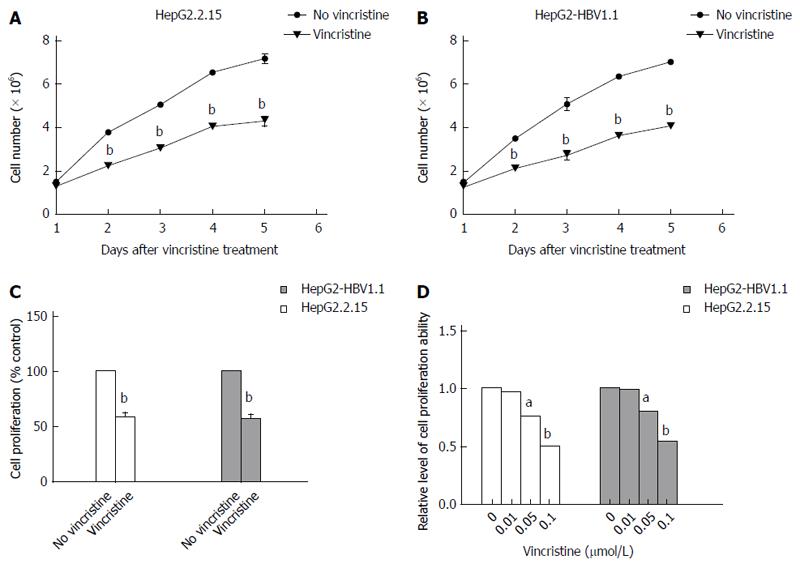Copyright
©The Author(s) 2015.
World J Gastroenterol. Feb 7, 2015; 21(5): 1498-1509
Published online Feb 7, 2015. doi: 10.3748/wjg.v21.i5.1498
Published online Feb 7, 2015. doi: 10.3748/wjg.v21.i5.1498
Figure 5 Vincristine inhibits the proliferation of HepG2.
2.15 cells and HepG2-HBV1.1 cells. HepG2.2.15 (4 × 105/well) and HepG2-HBV1.1 (6 × 105/well) cells were treated with vincristine at a concentration of 0.1 μmol/L for 24 h, and the medium was then changed to a drug-free culture medium. The cells were harvested 1, 2, 3, 4, and 5 d after vincristine treatment, respectively. A: The proliferation ability of HepG2.2.15 cells was examined using the trypan blue exclusion assay; B: The proliferation ability of the HepG2-HBV1.1 cells was examined using the trypan blue exclusion assay; C: Vincristine inhibits the proliferation of HepG2.2.15 cells and HepG2-HBV1.1 cells based on the BrdU incorporation test. Cells were treated with 0.1 μmol/L vincristine for 24 h and were transferred to 96-well plates (4 × 103/well) with drug-free culture medium for another 48 h incubation; D: Vincristine dose-dependently inhibited the proliferation of cells based on the trypan blue exclusion assay. HepG2.2.15 (4 × 105/well) and HepG2-HBV1.1 (6 × 105/well) cells were treated with vincristine at concentrations of 0, 0.01, 0.05, and 0.1 μmol/L for 24 h, respectively, followed by 48 h of incubation in drug-free culture medium. Values represent the mean ± SD of 3 independent experiments. aP < 0.05, bP < 0.01 vs control group (no vincristine).
- Citation: Xu L, Tu Z, Xu G, Hu JL, Cai XF, Zhan XX, Wang YW, Huang Y, Chen J, Huang AL. S-phase arrest after vincristine treatment may promote hepatitis B virus replication. World J Gastroenterol 2015; 21(5): 1498-1509
- URL: https://www.wjgnet.com/1007-9327/full/v21/i5/1498.htm
- DOI: https://dx.doi.org/10.3748/wjg.v21.i5.1498









